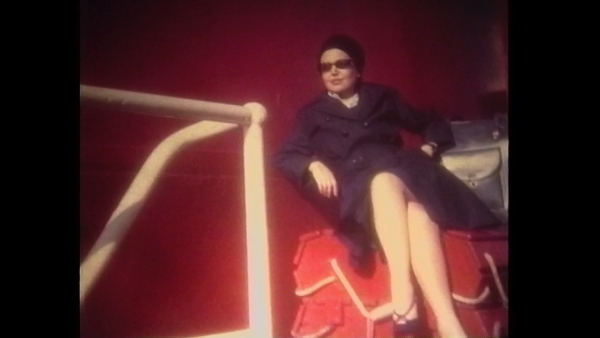
Dir.: Serdar Kökceoglu; Documentary with Ilhan Mimaroglu, Güngör Batum, Rüstem Batum; Turkey/USA 20219, 76 min.
Serdar Kökceoglu is a composer and filmmaker whose first feature is a vivid portrait of fellow Turkish composer, filmmaker and artist Ilhan Mimaroğlu (1926-2012), a leading composer of electronic music.
Structured in three chapters and using a dreamlike soundscape and evocative visual style the documentary recounts how Mimaroğlu emigrated from Turkey to the USA in 1959, spending the rest of his life in Manhattan as a composer and all-round artist. Mimaroğlu gradually develops into a diary of contemporary music-making in Manhattan in the late twentieth century. But equally important was his relationship with his wife Güngör Batum, whom he married in 1959 back in Istanbul. Both were idiosyncratic in their life style, but, as she said “We were like one person”.
After finishing law school at Istanbul University in 1949, Mimaroğlu had already made his name as a music critic. Later awarded a Rockefeller Foundation grant, he went on to study musicology under Paul Henry Lang at Columbia University. He would also work for the Columbia-Princeton Electronic Music Centre with Edgard Varese and Vladimir Ussachevsky. For Mimaroğlu,, cinema and music were one and the same, his compositions were “like collages, similar to editing a film”.
One of the highlights were his collaboration with Fellini for Satyricon. Working at Atlantic Records in the 1970ies, with Freddie Hubbard and Charles Mingus among others. Mimaroğlu founded his own label, Finnadar Records. German electronic visionary Karl-Heinz Stockhausen was one of his heroes, as was Jean Dubffet, who published Mimaroğlu’s own jazz compositions like ‘Tract A: A composition of Agitprop Music for Electromagnetic Tape’. Under his own record label, he met pianist concert pianist Idil Biret in 1972, the two of them working together for ten years, producing nine albums. After Finnadar Records folded in the 1980s, the composer stepped away from music and focused on street photography and films.
Mimaroğlu was always aware of status near the margins: “I am a composer, that’s one suicide. On top of it I am contemporary composer. And a composer of electronic music – and I compose political music.” He never wanted to go to a conservatoire in Turkey, “because they might teach me the wrong things”. And even in New York, he was critical of the places of higher learning: “University is a self-serving institution. This whole country, being the graveyard of culture, its universities being its mausoleums.” For him, music was alive, he collected tapes for sleeping from sounds of daily life. He compared himself to a preacher in the Sahara, nobody listening to him. “Even if they do, they fail to figure out what I was talking about”. He made a short film about people walking in slow-motion into a mall, past a poster which he had created, showing the MacDonald’s label with the inscription “Mc Lenin”. Like his friend and music critic David Toop said “his records were almost like Graffiti, that’s why he later became interested in Street Photography – the absolute immediacy.” And music writer Evin Ilyasoglu gave the feature its title” I think, he was mad, that people did not understand him. The Robinson of Manhattan. That’s why he was so pessimistic.” He felt that everyone was out to shoot contemporary composers. “Don’t shoot us, we are just innocent bystanders. When I am confronted with Mozart and Elvis, the question is, whom do I shoot first, its a matter of priority: Business or pleasure. And: “Do you think that I am paranoid in this respect? If so, there is a reason for it: Strauss Elvis, Mozart, all in the same bag”.
The third chapter concentrates on Güngör Batum, who had to branch out into business during her husband’s middle age, “becoming a left-wing artist and a business woman at the same time”. She was shattered at his death, living in denial of it for the rest of her life. “Shortly after losing him, I thought I could only manage the world with a new perspective. Because we had been really close, supported each other in every way. I had to work out how to live without him. The hardest period of my life”. Her son Rüstem, whom she left behind when she left the USA, talks abut the couple’s relationship:” When my mother had guests, Ilhan would just come into the room for a moment, would not greet anybody and leave the room. He was an anti-social person. I could not bond with him, only our relationship with cinema kept us going. He watched some films ten times. They were the polar opposites. He always lived in an apartment at Columbia university, where he always returned for the night.” After having spent many years on the balcony of her NYC apartment, Güngör Batum re-emigrated to Istanbul, reconstructing her life out of memories. In Istanbul she talked to friends about “Ilhan coming soon to join her in Turkey. “Than we can all meet together”. As Rüstem said, his mother had a way of deny certain occurrences in her life. So, for her it was “like living still with him, but by myself.”
With wonderful archive material, partly shot by the composer himself, this a real art history lesson. DoP Levent Türkan avoids too many Talking Heads, and concentrates Instead on conjuring up a palpable Cinematic essence of the man. A truly unique documentary about music and relationships, with Mimaroğlu having the last word: Old composers never die. They just turn into index cards”. AS
Burning Lights International Competition | ON VISIONS DU REEL | NYON SWITZERLAND | APRIL- MAY 2020